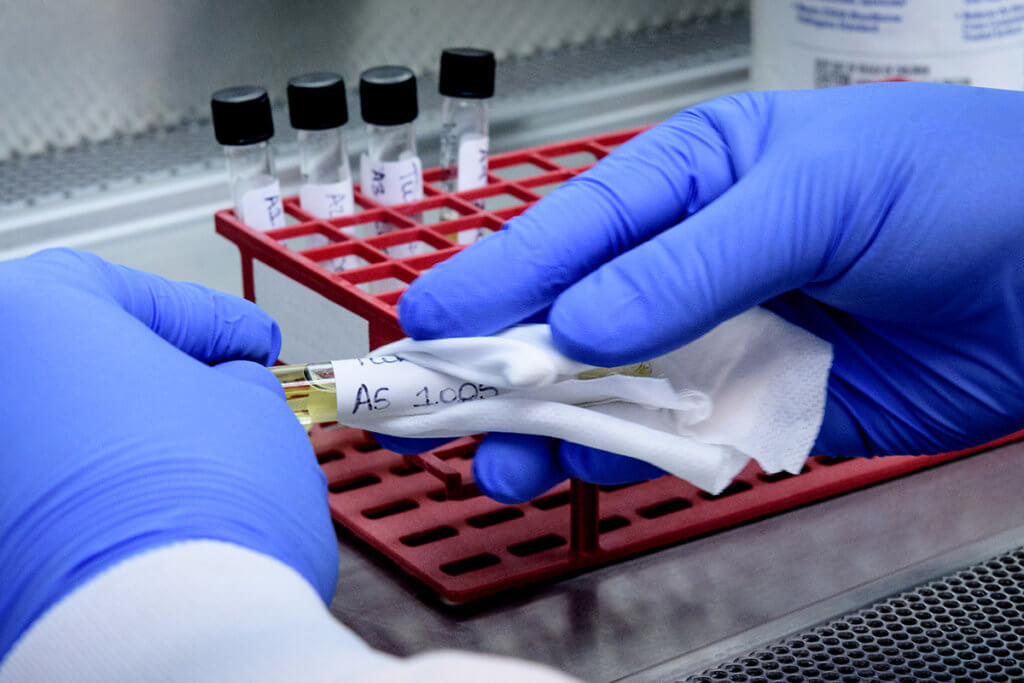
Innovators at Purdue’s Animal Disease Diagnostic Laboratory (ADDL) have used their expertise to make the on-campus testing facility one of the only labs in Indiana actively looking for and able to detect the UK variant of the COVID-19 virus. This ability, combined with the university’s data-driven testing approach, has made it possible for cases to be caught, thereby stopping any potential spread among the campus community.
The current PCR test run at the ADDL detects three viral gene targets – two of which must be positive to call the sample positive for SarsCoV2. Identification of the UK (B117) variant strain begins at the point of the ADDL’s analysis of the sample, where one of the three targets, the “S gene,” is absent while the other two gene targets are observed. This “S drop” pattern is a hallmark pattern in the B117 variants, but not all S drops are actually the variant – many are the original strain. When S drop is noted, the sample is sent to another lab on campus for whole genome sequencing of the virus. Sequencing results are typically available in two days and reveal any mutations or changes in the virus’s RNA, which can indicate a COVID-19 variant. All S drop samples detected at Purdue are sent to the Indiana State Department of Health, which then forwards the samples to the CDC.
More than 55,000 tests have been conducted since January 1. Of just over 1,000 positive tests in the spring semester, five cases of the UK COVID-19 variant have been confirmed in the Purdue campus community. The cases were detected as part of the university’s robust testing and contact tracing protocol and in collaboration with the Tippecanoe County Health Department and the Indiana Department of Health.
Four cases of the UK variant were detected in students during pre-arrival testing for the spring semester — two were roommates, and the other two unrelated. Each was arriving to campus from an international location. As previously announced, all students were required to have a negative test before the beginning of classes, and all students traveling internationally were and are required to quarantine before accessing campus. The four pre-arrival positives for the UK variant were discovered during that quarantine period. Contact tracing found that there was no spread due to the quarantine plan. The fifth case was recently identified in an individual who works in health care off campus. They have undergone isolation and contact tracing as well.
The Protect Purdue Chief Medical Officer, Dr. Esteban Ramirez, has discussed the presence of the variant and quarantine efforts during live-streamed Purdue Provost’s Conversations and during public Tippecanoe County Health Department briefings. “Our unique internal testing ability made us fortunate and able to catch the initial cases before returning to campus,” Dr. Ramirez said. “PPHC has not yet seen any difference in the severity in the small number of variant cases we have detected.”
Campus leaders, in consultation with the Protect Purdue Medical Advisory Team and Tippecanoe County health leaders, are examining closely the latest available evidence on the COVID-19 virus and newly reported strains, which also have been detected elsewhere in Indiana. Per the CDC, these new strains, which appear to spread more easily among individuals, do not appear to lead to more severe illness or increased risk of death at this time.
Importantly, all current strategies for mitigating the spread of the virus remain the most effective tools in protecting ourselves, others, and the Purdue’s community: the de-densification of classrooms and workspaces, physical distancing, avoiding large gatherings, the correct and consistent use of face masks, robust personal hygiene, staying home when sick, promptly isolating the infected and quarantining those in close contact for further evaluation, avoiding unnecessary travel, and proactively pursuing testing when activities or interactions suggest risk of exposure. Diligent adherence to the Protect Purdue Pledge — even in one’s shared residence and when off-campus or off-the-clock — is critically important, now more than ever.
Updates on testing numbers are posted daily on the Protect Purdue dashboard. More information is available on the Protect Purdue website.
